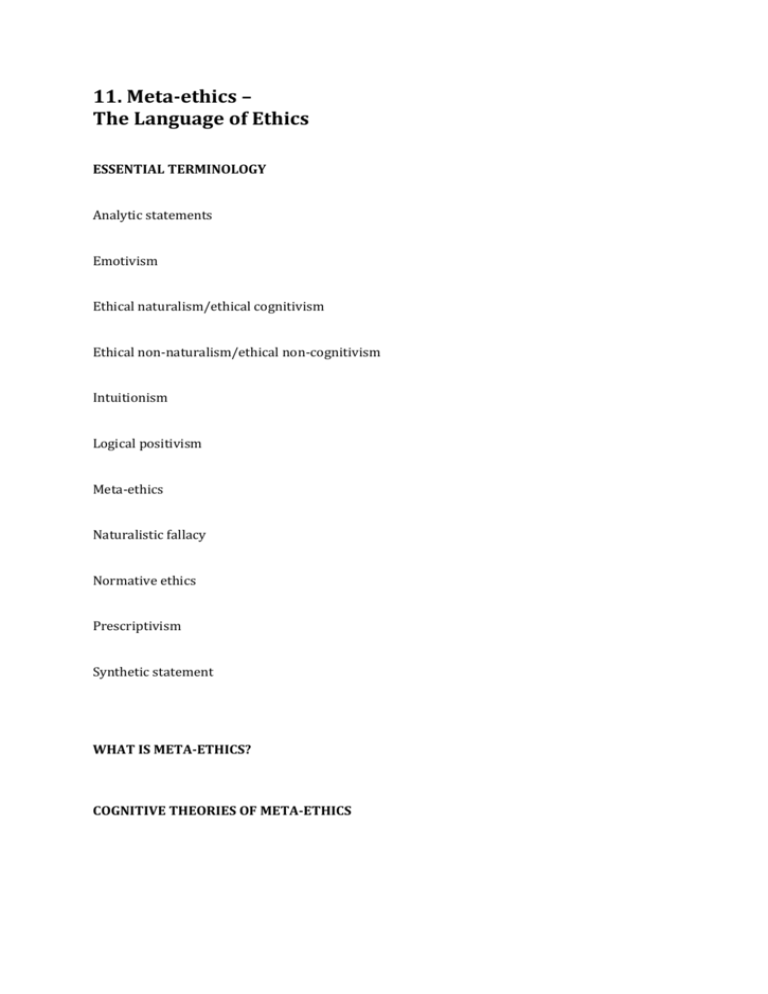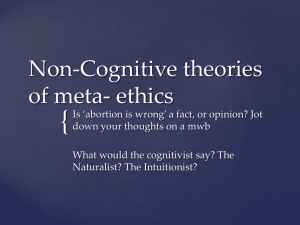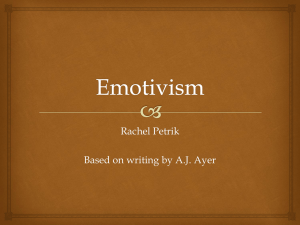Meta-ethics
advertisement

11. Meta-ethics – The Language of Ethics ESSENTIAL TERMINOLOGY Analytic statements Emotivism Ethical naturalism/ethical cognitivism Ethical non-naturalism/ethical non-cognitivism Intuitionism Logical positivism Meta-ethics Naturalistic fallacy Normative ethics Prescriptivism Synthetic statement WHAT IS META-ETHICS? COGNITIVE THEORIES OF META-ETHICS Metaethics Cognitive Noncognitive Subjective Objective Realist Ethical naturalism Ethical naturalism Cognitive and objective Ethical and nonethical statements are the same Ethical statements can be verified and falsified Anti-realist Criticisms of ethical naturalism – the naturalistic fallacy Intuitionism – G.E. Moore Moore's intuitionism Good is indefinable There are objective moral truths We know these moral truths by intuition Intuitionism – H.A. Prichard Prichard's intuitionism Obligations are as indefinable as good Intuition decides what to do in a situation Some people's intuition is better developed than others' Intuitionism – W.D. Ross Ross's intuitionism Prima facie duties are right Judgement must be used to decide what to do in any situation One duty can be rejected in favour of another Criticisms of intuitionism Meta-ethics Cognitive Noncognitive Subjective Objective Realist Ethical naturalism Intuitionism G.E. Moore H.A. Prichard W.D. Ross NON-COGNITIVE THEORIES OF META-ETHICS Emotivism – A.J. Ayer Emotivism – Ayer Words like 'good' are meaningless Ethical statements are just expressions of feeling Ethical statements cannot be validated Emotivism – C.L. Stevenson Emotivism – C.L. Stevenson Ethical statements are attitudes based on beliefs about the world Ethical statements are attempts to influence the views of others Ethical statements are subjective opinions Criticisms of emotivism Prescriptivism – R.M. Hare Prescriptivism – Hare Ethical statements are expressions of opinion Ethical statements are also universal They are not just expressing our views but prescribing them to others Criticisms of prescriptivism Thinkers: G.E. Moore F.H. Bradley H.A. Prichard W.D. Ross The theory is descriptive and does not help us make moral decisions Cognitive – assumes the existence of moral facts, but ‘good’ is indefinable Intuitionism Meta-ethical response to the Naturalistic Fallacy We intuit selfevident moral truths What are the objective moral truths? Thinkers: Logical Positivists A.J. Ayer Non-cognitive – moral facts are non-provable and so meaningless and non-factual The theory is descriptive and does not help us make moral decisions Emotivism Morality is just an expression of feeling – boo/hurrah Meta-ethical response to the Hume’s Fork Allows us to hold our own opinions and disagree with those of others Thinkers: R.H. Hare The theory is descriptive and does not help us make moral decisions Non-cognitive – moral facts are nonprovable and so meaningless and non-factual Prescriptivism Does not specify why one should follow one person’s prescriptions rather than another’s Morality is an expression of feeling, but it also prescribes our views to others Allows us to hold our own opinions and disagree with those of others






